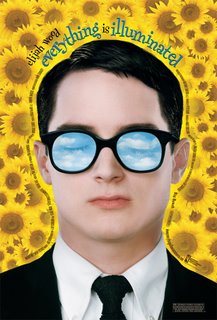 This is the kind of film title that really appeals to me. It's exaggerated; I mean, how often do people (other than me) go around saying things like "everything is illuminated"? It's bold; it's intense; it's a little much, really. But until today (when I finally saw the movie) I was dying to know just what was illuminated.
This is the kind of film title that really appeals to me. It's exaggerated; I mean, how often do people (other than me) go around saying things like "everything is illuminated"? It's bold; it's intense; it's a little much, really. But until today (when I finally saw the movie) I was dying to know just what was illuminated.To all those who didn't see the movie because you thought Frodo's glasses were absolutely ridiculous, get over it and add it to your Netflix queue.
I'm really struck by the concept of the collector, a central theme in the film. In case you haven't seen EiI, the protagonist (Jonathan) collects photographs, false teeth, pendants, sand--anything that helps him remember his family, who are survivors of the Holocaust--in Ziploc bags. He's withdrawn and his impulse to collect borders on the insance. But when you fully realize how close his family came to disappearing completely from anyone's memory or records, Jonathan seems like the only sane one--the only person who realizes the true value of the strange artifacts that are pinned up all over his walls.
 But of course, because Jonathan is simply a collector, the movie is not actually about him; he is only the vehicle for another Holocaust survivor to remember. I guess at this point I should post a spoiler warning. I just really feel the need to process, so don't read any further if you haven't seen the film yet.
But of course, because Jonathan is simply a collector, the movie is not actually about him; he is only the vehicle for another Holocaust survivor to remember. I guess at this point I should post a spoiler warning. I just really feel the need to process, so don't read any further if you haven't seen the film yet.Here is my question: what does Baruch's death mean? Does he kill himself because of the guilt he feels about abandoning his faith, and as a result being one of the only people who survived? It would seem, from the significant transformation he undergoes, that he is at peace when he dies--yet his is not a peaceful departure from life. Does he feel that he needs to die a bloody death in order to be united with his family and fellow villagers? Can suicide provide any kind of relief at all?
Clearly, for me, not everything is illuminated.
But what an amazing movie. The title line of the film provides such a different perspective on history than we're used to:
"Everything is illuminated in the light of the past, which is inside us looking out."This is the most optimistic, yet honest, approach to the past, present, and future that I think I have ever heard. Especially for those of us who are living in the shadow of the turbulent, bloody 20th century, it is easy to over-focus on the past, wishing humankind hadn't made the mistakes it has, when we really need to live in the present with the knowledge and memory we glean from the past.
This all seems very half-baked right now . . . maybe I'll post more after the second viewing, when my thoughts are better gathered.
But for now, all I can say is that this is truly a premium film.
5 comments:
okay. i want to see it. maybe your second viewing? ;)
Is this a date?
:)
ha ha haaaa. well.
yeah.
:D
I will definitely look into Foer's books -- thanks for the tip!
I'm so curious about them; actually, my dad told me that Everything is Illuminated (the book) is really terrible, and that he feels the movie really improved upon the book. Which of course just gives me a burning desire to read the book -- I have to know!
You inspired me to pick this up at the library when I saw it. I have to concur on how premium the film is. I particularly enjoyed the development of Alex the younger (the premium dancer with whom so many girls want to be carnal) who thinks Jews have "%@^$ between their brains" but then realizes that he is a Jew. My biggest curiosity is... How did he realize that he was a Jew if the grandfather never told him? And he is seen as more devoted now (wearing the yarmulke and all); does that mean that he has rededicated himself and changed his lifestyle? I wonder.
As a sidenote: Did you happen to see the "Additional Scenes"? I'm glad they didn't make it into the film because they are so over the top but I enjoyed seeing them nonetheless. To have Jesus cheering and Gandhi raise da roof was fantastic.
Oh, and one more interesting thing of note. In one of the beginning scenes the real Jonathan Safran Foer makes an appearance as a leaf blower in the cemetery.
Post a Comment